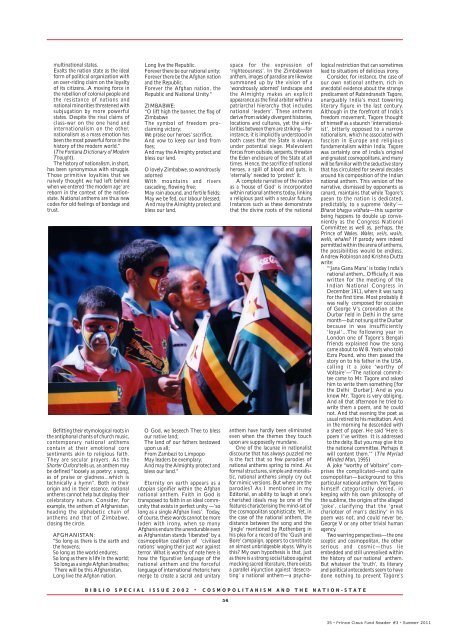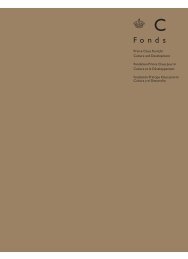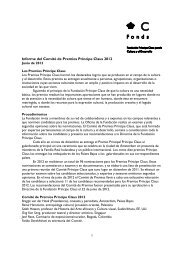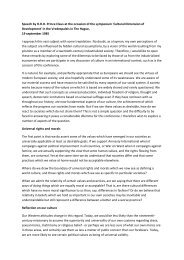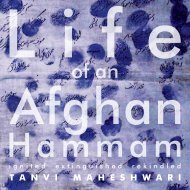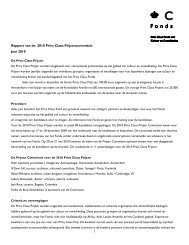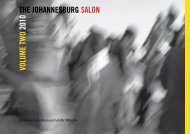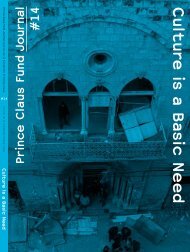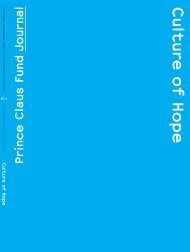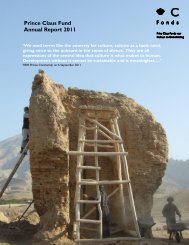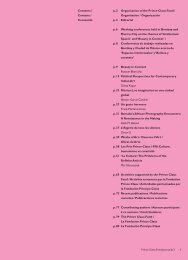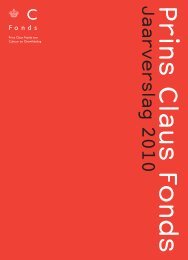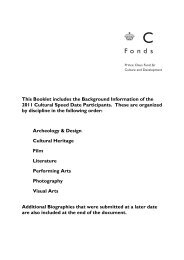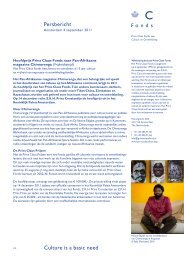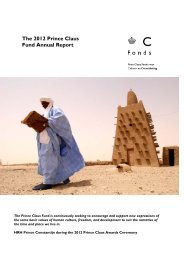3 summer 2011 - Prince Claus Fund
3 summer 2011 - Prince Claus Fund
3 summer 2011 - Prince Claus Fund
- No tags were found...
Create successful ePaper yourself
Turn your PDF publications into a flip-book with our unique Google optimized e-Paper software.
multinational states.Exalts the nation state as the idealform of political organization withan over-riding claim on the loyaltyof its citizens...A moving force inthe rebellion of colonial people andthe resistance of nations andnational minorities threatened withsubjugation by more powerfulstates. Despite the rival claims ofclass-war on the one hand andinternationalism on the other,nationalism as a mass emotion hasbeen the most powerful force in thehistory of the modern world.”(The Fontana Dictionary of ModernThought).The history of nationalism, in short,has been synonymous with struggle.Those primitive loyalties that wenaively thought we had left behindwhen we entered ‘the modern age’ arereborn in the context of the nationstate.National anthems are thus newcodes for old feelings of bondage andtrust.Befitting their etymological roots inthe antiphonal chants of church music,contemporary national anthemscontain at their emotional coresentiments akin to religious faith.They are secular prayers. As theShorter Oxford tells us, an anthem maybe defined “loosely as poetry; a song,as of praise or gladness...which istechnically a hymn”. Both in theirorigin and in their essence, nationalanthems cannot help but display theircelebratory nature. Consider, forexample, the anthem of Afghanistan,heading the alphabetic chain ofanthems and that of Zimbabwe,closing the circle.AFGHANISTAN:“So long as there is the earth andthe heavens;So long as the world endures;So long as there is life in the world;So long as a single Afghan breathes;There will be this Afghanistan.Long live the Afghan nation.Long live the Republic.Forever there be our national unity;Forever there be the Afghan nationand the Republic.Forever the Afghan nation, theRepublic and National Unity.”ZIMBABWE:“O lift high the banner, the flag ofZimbabweThe symbol of freedom proclaimingvictory;We praise our heroes’ sacrifice,And vow to keep our land fromfoes;And may the Almighty protect andbless our land.O lovely Zimbabwe, so wondrouslyadornedWith mountains and riverscascading, flowing free;May rain abound, and fertile fields;May we be fed, our labour blessed;And may the Almighty protect andbless our land.O God, we beseech Thee to blessour native land;The land of our fathers bestowedupon us all;From Zambezi to LimpopoMay leaders be exemplary;And may the Almighty protect andbless our land.”Eternity on earth appears as autopian signifier within the Afghannational anthem. Faith in God istransposed to faith in an ideal communitythat exists in perfect unity —‘solong as a single Afghan lives’. Today,of course, these words cannot be moreladen with irony, when so manyAfghanis endure the unendurable evenas Afghanistan stands ‘liberated’ by acosmopolitan coalition of ‘civilisednations’ waging their just war againstterror. What is worthy of note here ishow the figurative language of thenational anthem and the forcefullanguage of international rhetoric heremerge to create a sacral and unitaryspace for the expression of‘righteousness’. In the Zimbabweananthem, images of paradise are likewisesummoned up by the vision of a‘wondrously adorned’ landscape andthe Almighty makes an explicitappearance as the final arbiter within apatriarchal hierarchy that includesnational ‘leaders’. These anthemsderive from widely divergent histories,locations and cultures, yet the similaritiesbetween them are striking—forinstance, it is implicitly understood inboth cases that the State is alwaysunder potential siege. Malevolentforces from outside, serpents, threatenthe Eden enclosure of the State at alltimes. Hence, the sacrifice of nationalheroes, a spill of blood and guts, is‘eternally’ needed to ‘protect’ it.A complete narrative of the nationas a ‘house of God’ is incorporatedwithin national anthems today, linkinga religious past with a secular future.Instances such as these demonstratethat the divine roots of the nationalanthem have hardly been eliminatedeven when the themes they touchupon are supposedly mundane.One of the lacunae in nationalistdiscourse that has always puzzled meis the fact that so few parodies ofnational anthems spring to mind. Asformal structures, simple and moralistic,national anthems simply cry outfor mimic versions. But where are theparodies? As I mentioned in myEditorial, an ability to laugh at one’scherished ideals may be one of thefeatures characterising the mind-set ofthe cosmopolitan sophisticate. Yet, inthe case of the national anthem, thedistance between the song and the‘jingle’ mentioned by Rothenberg inhis plea for a record of the ‘Gush andBore’ campaign, appears to constitutean almost unbridgeable abyss. Why isthis? My own hypothesis is that, justas there is a strong social taboo againstmocking sacred literature, there existsa parallel injunction against ‘desecrating’a national anthem—a psycho-logical restriction that can sometimeslead to situations of delicious irony.Consider, for instance, the case ofour own national anthem, rich inanecdotal evidence about the strangepredicament of Rabindranath Tagore,unarguably India’s most toweringliterary figure in the last century.Although in the forefront of India’sfreedom movement, Tagore thoughtof himself as a staunch ‘internationalist’,bitterly opposed to a narrownationalism, which he associated withfascism in Europe and religiousfundamentalism within India. Tagorewas certainly one of India’s originaland greatest cosmopolitans, and manywill be familiar with the seductive storythat has circulated for several decadesaround his composition of the Indiannational anthem. This version of thenarrative, dismissed by opponents ascanard, maintains that while Tagore’spaean to the nation is dedicated,predictably, to a supreme ‘deity’—Bharat bhagya vidhata—this superiorbeing happens to double up convenientlyas the Congress NationalCommittee as well as, perhaps, the<strong>Prince</strong> of Wales. Wales, veils, wails,wells, whales? If parody were indeedpermitted within the arena of anthems,the possibilities would be endless.Andrew Robinson and Krishna Duttawrite:“‘Jana Gana Mana’ is today India’snational anthem...Officially, it waswritten for the meeting of theIndian National Congress inDecember 1911, where it was sungfor the first time. Most probably itwas really composed for occasionof George V’s coronation at theDurbar held in Delhi in the samemonth—but not sung at the Durbarbecause in was insufficiently‘loyal’...The following year inLondon one of Tagore’s Bengalifriends explained how the songcame about to W. B. Yeats who toldEzra Pound, who then passed thestory on to his father in the USA,calling it a joke ‘worthy ofVoltaire’—‘The national committeecame to Mr. Tagore and askedhim to write them something [forthe Delhi Durbar]. And as youknow Mr. Tagore is very obliging.And all that afternoon he tried towrite them a poem, and he couldnot. And that evening the poet asusual retired to his meditation. Andin the morning he descended witha sheet of paper. He said ‘Here ispoem I’ve written. It is addressedto the deity. But you may give it tothe national committee. Perhaps itwill content them.’” (The MyriadMinded Man, 1995)A joke “worthy of Voltaire” comprisesthe complicated—and quitecosmopolitan—background to thisparticular national anthem. Yet Tagorehimself categorically denied, inkeeping with his own philosophy ofthe sublime, the origins of the alleged‘joke’, clarifying that the ‘greatcharioteer of man’s destiny’ in hispoem was not, and could never be,George V or any other trivial humanagency.Two warring perspectives—the onesceptic and cosmopolitan, the otherserious and cosmic—thus lieembedded and still unresolved withinthe history of our national anthem.But whatever the ‘truth’, its literaryand political antecedents seem to havedone nothing to prevent Tagore’sB I B L I O S P E C I A L I S S U E 2 0 0 2 ● C O S M O P O L I T A N I S M A N D T H E N A T I O N - S T A T E5635 · <strong>Prince</strong> <strong>Claus</strong> <strong>Fund</strong> Reader #3 · Summer <strong>2011</strong>


